2022年中考英语考点复习课件:第一章 第二节 牛津译林版七年级上册Units 1-4(39张PPT无素材)
文档属性
| 名称 | 2022年中考英语考点复习课件:第一章 第二节 牛津译林版七年级上册Units 1-4(39张PPT无素材) | 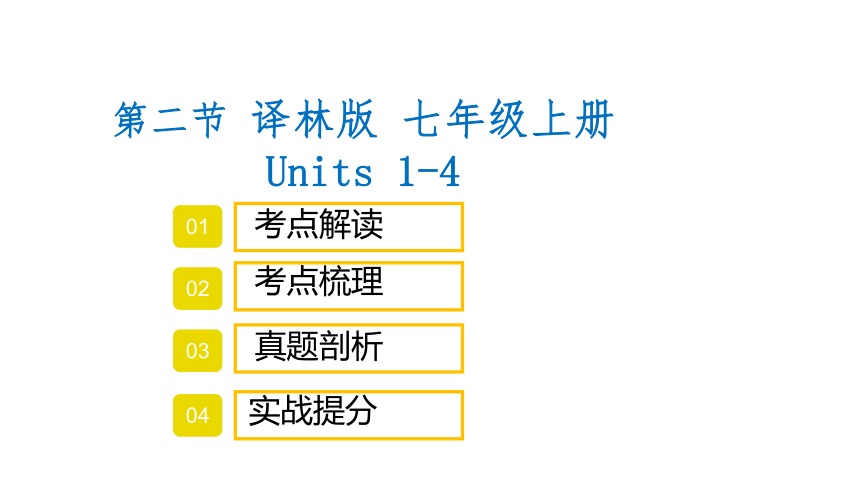 | |
| 格式 | pptx | ||
| 文件大小 | 338.5KB | ||
| 资源类型 | 教案 | ||
| 版本资源 | 牛津译林版 | ||
| 科目 | 英语 | ||
| 更新时间 | 2022-05-11 23:01:54 | ||
图片预览


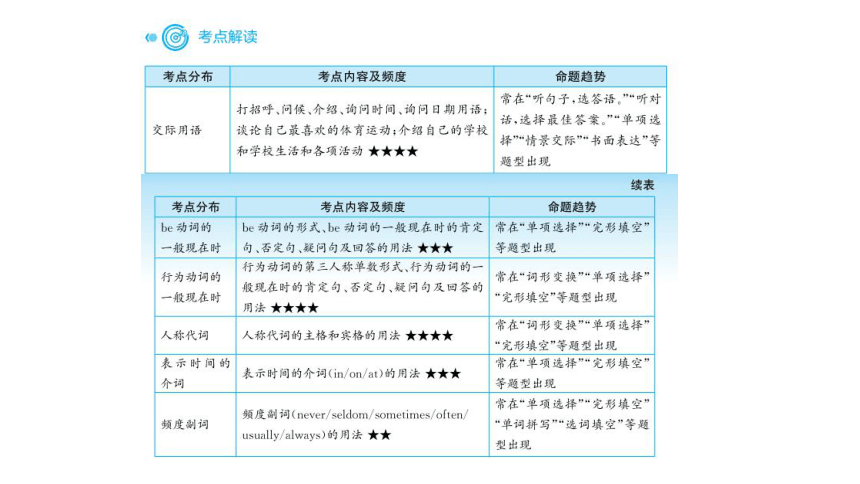
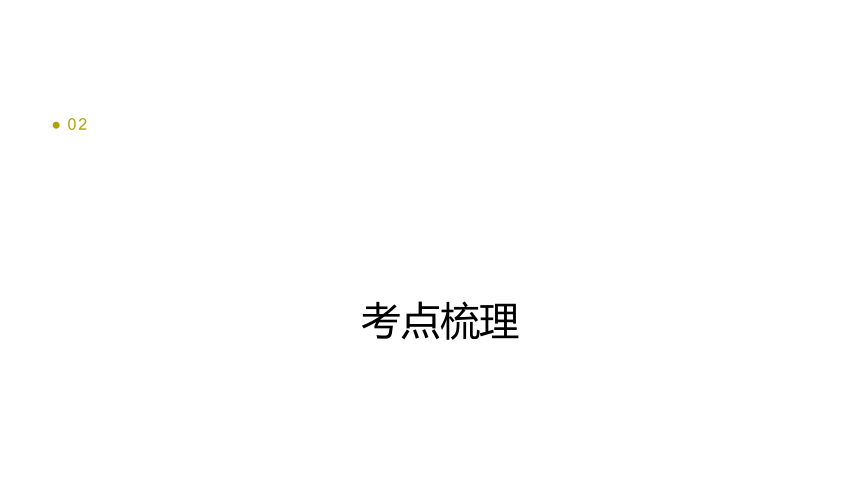
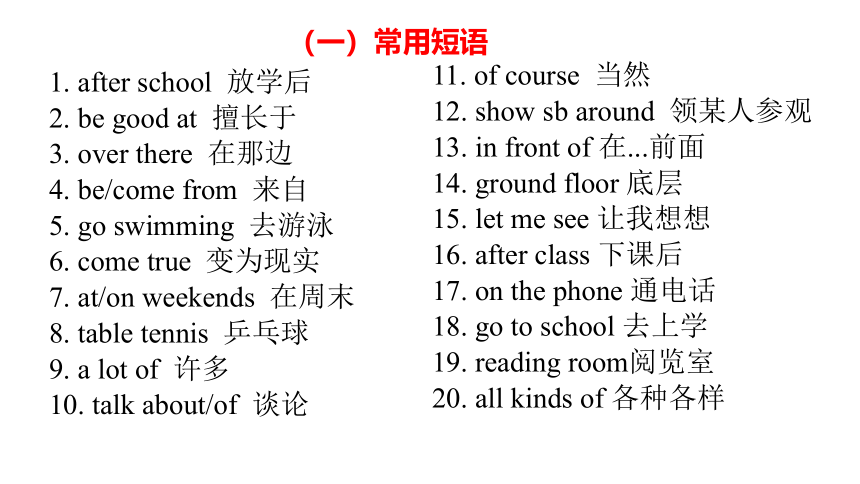
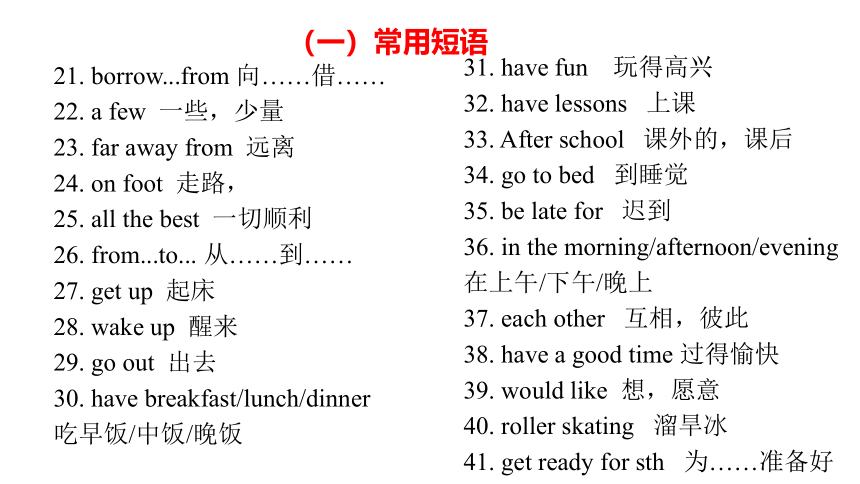
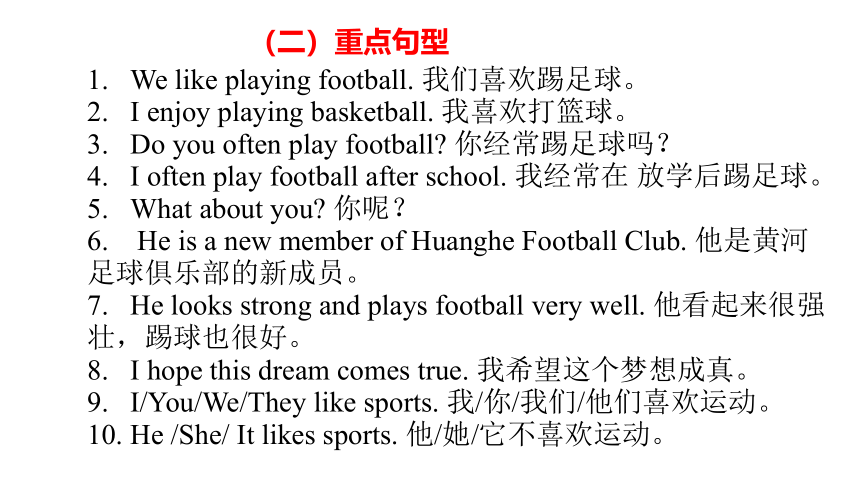
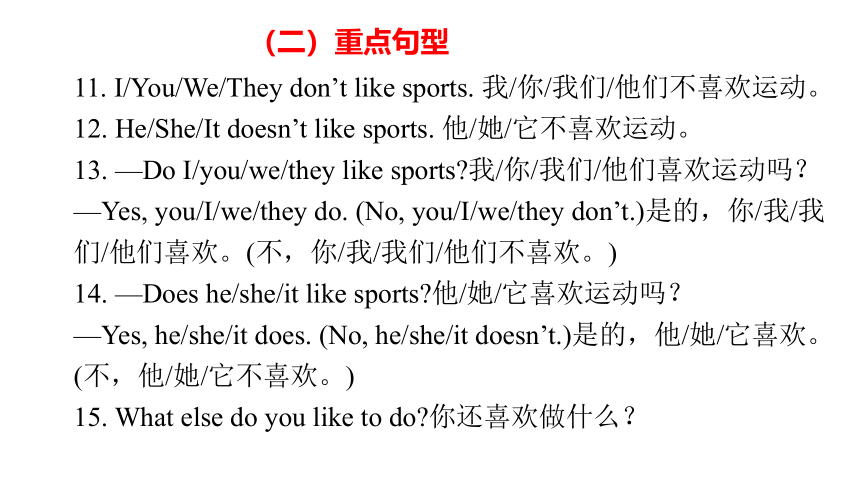
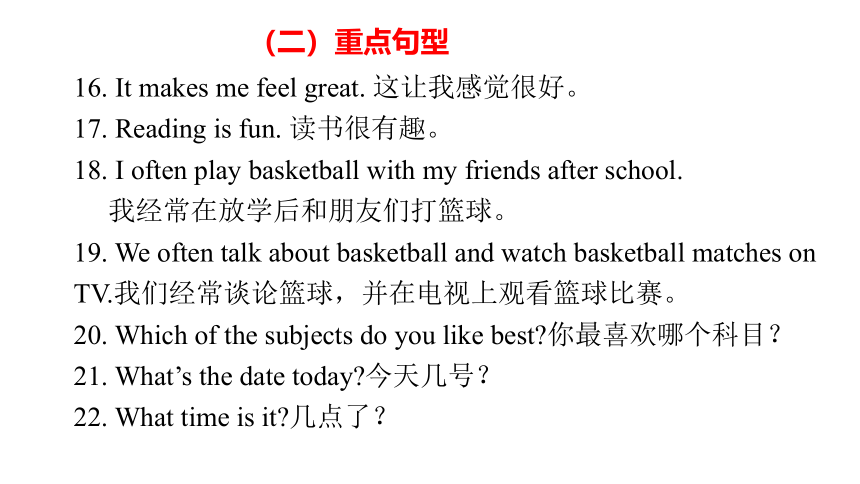
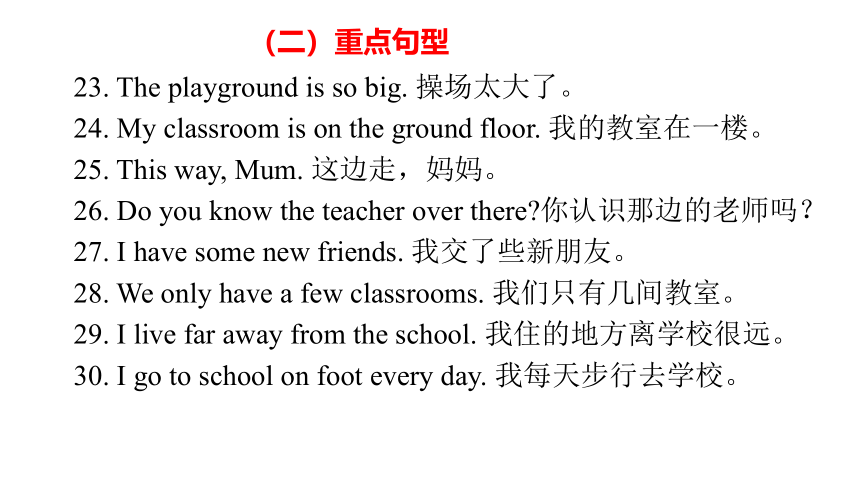
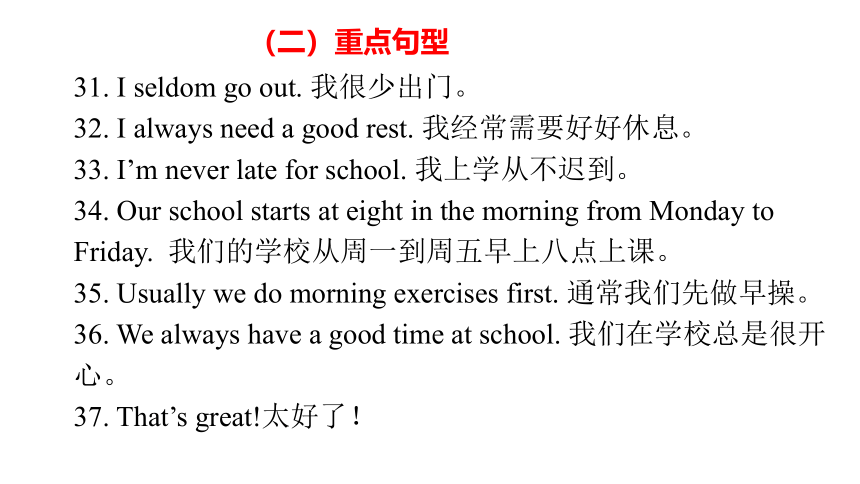
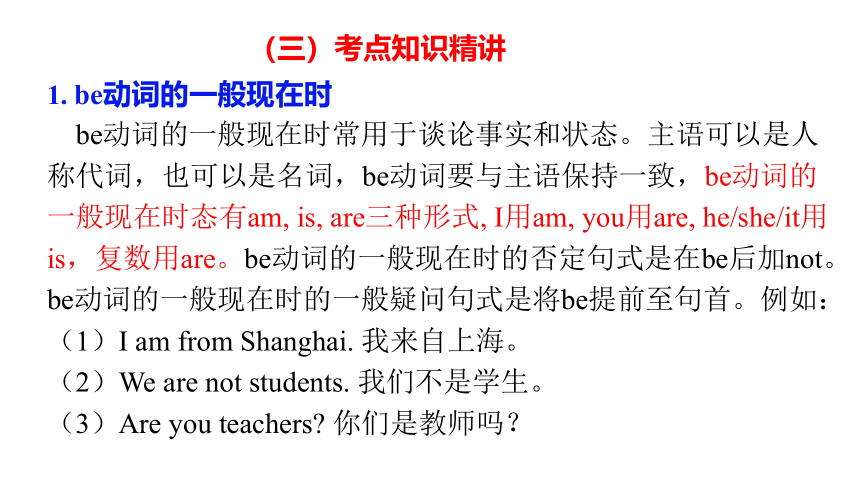
文档简介
(共39张PPT)
01
考点解读
02
03
04
考点梳理
真题剖析
实战提分
第二节 译林版 七年级上册
Units 1-4
01
考点解读
02
考点梳理
1. after school 放学后
2. be good at 擅长于
3. over there 在那边
4. be/come from 来自
5. go swimming 去游泳
6. come true 变为现实
7. at/on weekends 在周末
8. table tennis 乒乓球
9. a lot of 许多
10. talk about/of 谈论
11. of course 当然
12. show sb around 领某人参观
13. in front of 在...前面
14. ground floor 底层
15. let me see 让我想想
16. after class 下课后
17. on the phone 通电话
18. go to school 去上学
19. reading room阅览室
20. all kinds of 各种各样
(一)常用短语
(一)常用短语
21. borrow...from 向……借……
22. a few 一些,少量
23. far away from 远离
24. on foot 走路,
25. all the best 一切顺利
26. from...to... 从……到……
27. get up 起床
28. wake up 醒来
29. go out 出去
30. have breakfast/lunch/dinner
吃早饭/中饭/晚饭
31. have fun 玩得高兴
32. have lessons 上课
33. After school 课外的,课后
34. go to bed 到睡觉
35. be late for 迟到
36. in the morning/afternoon/evening
在上午/下午/晚上
37. each other 互相,彼此
38. have a good time 过得愉快
39. would like 想,愿意
40. roller skating 溜旱冰
41. get ready for sth 为……准备好
We like playing football. 我们喜欢踢足球。
I enjoy playing basketball. 我喜欢打篮球。
Do you often play football 你经常踢足球吗?
I often play football after school. 我经常在 放学后踢足球。
What about you 你呢?
6. He is a new member of Huanghe Football Club. 他是黄河足球俱乐部的新成员。
7. He looks strong and plays football very well. 他看起来很强壮,踢球也很好。
8. I hope this dream comes true. 我希望这个梦想成真。
9. I/You/We/They like sports. 我/你/我们/他们喜欢运动。
10. He /She/ It likes sports. 他/她/它不喜欢运动。
(二)重点句型
(二)重点句型
11. I/You/We/They don’t like sports. 我/你/我们/他们不喜欢运动。
12. He/She/It doesn’t like sports. 他/她/它不喜欢运动。
13. —Do I/you/we/they like sports 我/你/我们/他们喜欢运动吗?
—Yes, you/I/we/they do. (No, you/I/we/they don’t.)是的,你/我/我们/他们喜欢。(不,你/我/我们/他们不喜欢。)
14. —Does he/she/it like sports 他/她/它喜欢运动吗?
—Yes, he/she/it does. (No, he/she/it doesn’t.)是的,他/她/它喜欢。(不,他/她/它不喜欢。)
15. What else do you like to do 你还喜欢做什么?
16. It makes me feel great. 这让我感觉很好。
17. Reading is fun. 读书很有趣。
18. I often play basketball with my friends after school.
我经常在放学后和朋友们打篮球。
19. We often talk about basketball and watch basketball matches on TV.我们经常谈论篮球,并在电视上观看篮球比赛。
20. Which of the subjects do you like best 你最喜欢哪个科目?
21. What’s the date today 今天几号?
22. What time is it 几点了?
(二)重点句型
23. The playground is so big. 操场太大了。
24. My classroom is on the ground floor. 我的教室在一楼。
25. This way, Mum. 这边走,妈妈。
26. Do you know the teacher over there 你认识那边的老师吗?
27. I have some new friends. 我交了些新朋友。
28. We only have a few classrooms. 我们只有几间教室。
29. I live far away from the school. 我住的地方离学校很远。
30. I go to school on foot every day. 我每天步行去学校。
(二)重点句型
31. I seldom go out. 我很少出门。
32. I always need a good rest. 我经常需要好好休息。
33. I’m never late for school. 我上学从不迟到。
34. Our school starts at eight in the morning from Monday to Friday. 我们的学校从周一到周五早上八点上课。
35. Usually we do morning exercises first. 通常我们先做早操。
36. We always have a good time at school. 我们在学校总是很开心。
37. That’s great!太好了!
(二)重点句型
(三)考点知识精讲
1. be动词的一般现在时
be动词的一般现在时常用于谈论事实和状态。主语可以是人称代词,也可以是名词,be动词要与主语保持一致,be动词的一般现在时态有am, is, are三种形式, I用am, you用are, he/she/it用is,复数用are。be动词的一般现在时的否定句式是在be后加not。be动词的一般现在时的一般疑问句式是将be提前至句首。例如:
(1)I am from Shanghai. 我来自上海。
(2)We are not students. 我们不是学生。
(3)Are you teachers 你们是教师吗?
(三)考点知识精讲
2. 行为动词的一般现在时
行为动词的一般现在时常用于我们经常做的事、目前的爱好、能力等以及来受时限的客观事实。根据主语的人称和数的不同,行为动词的一般现在时有两种形式。当主语是第一、第二人称和复数时,行为动词用原形。当主语是第三人称单数时,行为动词用第三人称单数形式。行为动词的一般现在时的否定句式在行为动词前添加do not或does not,当主语是第三人称单数时,助动词用does。行为动词的一般现在时的一般疑问句式是在句首添加do或does,当主语是第三人称单数时,助动词用does。例如:
(1)We often go to school at seven. 我们经常在七点钟上学。
(2)They don‘t like play basketball. 他们不喜欢打篮球。
(三)考点知识精讲
3. 人称代词的主格和宾格的用法
我们常常用人称代词来代替表示人或物的名词。如果人称代词在句子中作主语时,用主格;如果人称代词在句子中作宾语时,用宾格。例如:
(1)Lucy and I are twins. We are from the USA. 露西和我是双胞胎,我们来自美国。
(2)She often helps me with my English. 她经常帮助我学习英语。
人称代词的主语和宾格归纳如下:
人称代词 单数 复数 第一人称 第二人称 第三人称 第一人称 第二人称 第三人称
主格 I you he she it we you they
宾语 me you him her it us you them
(三)考点知识精讲
4. 表示时间的介词
常用来表示时间的介词有:in、on和at。 in 用于一天中的早、中、晚和月份、季节;on用于星期、某一天、某一天的早、中、晚和特定的节日(一天);at用于某一时刻和年龄。例如:
(1)He was born in 1997. 他出生于1997年。
(2)He often plays football on Sunday. 他经常在星期天踢足球。
(3)He went to bed at ten last night. 他昨晚十点钟睡觉。
5. 频度副词
频度副词表示做某事的频率。例如:
(1)I always get up at six in the morning. 我总是在早上六点起床。
(2)I am never late for school. 我上学从不迟到。
(3)Sometimes I go to school on foot. 有时我走路上学。
(三)考点知识精讲
6. be from
be from是固定短语,意为“来自”,相当于come from。be from所在的句子变为疑问句或否定句时,将be提前或在be后加 not;而come from所在的句子变为疑问句或否定句时,要借助助动词do 或does。例如:
(1)I am from Beijing =I come from Beijing. 我来自北京。
(2)He isn’t from France. =He doesn’t come from France.
他不是来自法国。
7. be good at
be good at相当于do well in后面接名词、代词或动名词。例如:
(1)She is good at singing. 她擅长唱歌。
(2)She does well in English. 她的英语学得好。
(三)考点知识精讲
8. enjoy
enjoy作及物动词,表示“享受……的乐趣,喜爱”,后通常跟名词或动词-ing形式作宾语。例如:
(1)She enjoys swimming. 她喜欢游泳。
(2)My sister enjoys music. 我妹妹喜欢音乐。
9. come true
come true为动词短语,意为“变为现实,成为事实”。例如:
I help my dream comes true. 我希望我的梦想成真。
(三)考点知识精讲
10. a lot of
a lot of=lots of意为“许多,大量”可以修饰可数名词和不可数名词。修饰可数名词时,相当于many,修饰不可数名词时,相当于much。例如:
(1)There are a lot of/many students in the playground. 操场上有许多学生。
(2)I have a lot of/much homework to do. 我有许多作业要做。
11. in front of与in the front of
in front of意为“在……前面”,强调在某一物体外部的前面;in the front of意为“在……前部”,强调强调在某一物体内部的前面。例如:
(1)There is a big tree in front of our classroom. 在我们教室前面有一棵树。(在教室外)
(2)There is a table in the front of our classroom. 在我们教室前面有一张桌子。(在教室内)
(三)考点知识精讲
12. also, too与either
三个词意思都是“也”,also一般放在句中,用于肯定句,too只能放在句尾,用于肯定句,either只能放在句尾,用于否定句。例如:
(1)I also like playing football. 我也喜欢踢足球。
(2)My father is a teacher too. 我父亲也是一名老师。
(3)I have not seen him either. 我也没有看见过他。
13. say, speak, talk与tell
say意为“说、讲”,指用系统的言语表达自己的想法,强调说话内容。speak意为“说话、发言、说”,指系统地发表长篇大论或断断续续地说话。talk 意为“讲话、谈话”,指交流式谈话。tell 意为“告诉”指传达某事给某人。例如:
(1)He speaks Chinese quite well. 他汉语说得相当好。
(2)I can say it in English. 我能用英语说它。
(三)考点知识精讲
14. how
how作疑问副词,意为“如何,怎样”,可用来询问做某事的方式。例如:
—How do you often go to school 你经常怎样上学?
—I often go to school by bus. 我经常乘公共汽车上学。
15. by
by+表示交通工具的名词意为“乘,坐”。by后接表示交通工具的名词时,名词前不加任何限定词。例如:
I am going to Beijing by plane. 我准备乘飞机去北京。
(三)考点知识精讲
16. It takes sb some time to do sth.
“It takes sb some time to do sth. ”意为“做某事花某人多长时间”。在该句型中,it作形式主语,后面的动词不定式作真正主语。例如:
It usually takes me an hour to do my homework. 做作业通常花我一个小时。
17. borrow与lend
borrow作为动词,意为“借、借用”,表示主语从别人那里借来东西(借入),常与介词from连用。borrow有反义词lend意为“借出”,常与介词to连用。例如:
(1)I borrow a book from my friend. 我从我朋友那借了一本书。
(2)My friend lend a book to me. 我朋友借给我一本书。
(三)考点知识精讲
18. a few与few
a few意为“一些,少量”,修饰可数名词的复数形式,表示肯定意义。few意为“几乎没有”,修饰可数名词的复数形式,表示否定意义。例如:
(1)I have a few friends here. 我在这里有一些朋友。(2)I have few friends here. 我在这里几乎没有朋友。
19. It is time for/to...
It is time for... 意为“到该……的时候了”,for 后接名词. It is time to... 意为“到该做某事的时候了”,to后接动词原形。
(三)考点知识精讲
例如:
(1)It is time for class. 到该上课的时候了。
(2)It is time to do my homework. 到该做我的作业的时候了。
20. how often
how often意为“多久一次”,表示频度的词提问,常见表示频度的词和短语有:usually, always, sometimes, never, once a week等。例如:
—How often do you play computer games 你多久玩一次电子游戏?
—Once a week. 一周一次。
03
真题剖析
真题链接
【例1】(2021年阜新)— Hello, May I speak to Kate?
—Hello.____________.
A. My name’s Kate B. I’m Kate
C. Kate is me D. This is Kate speaking
【解析】Hello, May I speak to Kate?我可以和凯特通话吗?在打电话时,句型This is... 表示“我是... ”。This is Kate speaking.我是凯特。故选D。
真题链接
【例2】(2020年重庆)The wild animals are in danger now. Let’s protect .
A. they B. them
C. their D. theirs
【解析】考查人称代词的用法。分析句子结构可知此处代词应用宾格。故选B。
真题链接
【例3】(2020年北京)Usually I make breakfast for my family_______Saturdays.
A. at B. in
C. on D. to
【解析】考查介词词义辨析。句意:通常我在星期六为我的家人做早餐。在星期前面用介词on。故选C。
真题链接
【例4】(2020年恩施)I hear that it often ______ in Sichuan and there are usually floods, especially in summer.
A. rains B. rained C. will rain
【解析】考查行为动词的一般现在时。根据句意和“often”可知此处应用一般现在时。故选A。
真题链接
【例5】(2021 河池)—Is this your bike,Cindy?
—Yes, it’s ______ . My mother bought it for me last month.
A. hers B. his C. yours D. mine
【解析】hers她的;his他的;yours你的;mine我的。根据语境“——辛迪,这是你的自行车吗?——是的,它是。我妈妈上个月给我买的。”可知,“mine”符合题意,即自行车是我的。故选D。
易错剖析
【例1】Neither Tom nor his father ____ interested in playing football.
A. is B. am C. are D. be
【解析】在neither... nor句型中,动词的选择遵循“就近原则”,his father是单数,所以be动词用单数形式,所缺的be动词是is。故选A。此题容易误选C。
易错剖析
【例2】Many villagers will move to new houses _____ 2021.
A. in B. on C. at D. for
【解析】本题考查表示时间的介词用法。in用于年、月、世纪等前或泛指一天上午、下午、晚上前,根据空后的“2021”可知此处应用in。故选A。此题容易误选B。
易错剖析
【例3】Lucy _____ some books ____the library yesterday.
A. borrowed; to B. borrowed; from
C. lent; from D. lent; to
【解析】本题考查动词borrow和lend的用法。borrow 作为动词,意为“借,借用”,表示主语从别人那里借来东西(借入),常与介词from连用。borrow有反义词lend意为“借出”,常与介词to连用。故答案选B。此题容易误选C。
04
实战提分
基础过关
(一)单词检测。根据中文意思,写出下列单词。
1. 年级 __________ 2. 同班同学__________
3. 教室 __________ 4. 可爱的 ____________
5. 网球 __________ 6. 成员 ___________
7. 梦想 __________ 8. 比赛 ___________
9. 地理 __________ 10. 历史 ___________
11. 会议 __________ 12. 明亮的 _________
13. 很少 __________ 14. 家庭作业 _________
15. 活动 __________ 16. 从不 __________
grade
classmate
classroom
cute
tennis
member
dream
match
geography
history
meeting
bright
seldom
homework
activity
never
基础过关
(二)短语回顾。根据中文或英文表达,翻译下列短语。
1. 放学后 ___________ 2. 擅长于 ___________
3. 去游泳 ___________ 4. 当然 _____________
5. 起床 _____________ 6. 出去 _____________
7. 走路 _____________ 8. 上课 _____________
9. have lunch _________ 10. go to bed ________
11. be late for ________ 12. in front of ________
13. wake up __________ 14. go to school _______
after school
be good at
go swimming
of course
get up
go out
on foot
have lessons
吃午餐
去睡觉
迟到
在……前面
醒来
上学
拓展提升
(一)单词拼写。根据括号内所给的中文提示,正确拼写单词。
1. He is good at __________ (历史).
2. She likes playing __________ (排球).
3. The Smiths and my family live on the __________ (第五) floor, we are good neighbours.
4. Our classroom is clean and __________ (明亮的).
5. Her _________ (业余爱好) is dancing.
(二)词形变换。根据句意,用括号中所给单词的正确形式填空。
1. Look, every one of them __________ (have) a new computer.
2. There are many __________ (sheep) on the farm.
3. She often goes __________ (swim) on Sunday.
4. There __________ (be) some pens on the desk.
5. Sandy often __________ (watch) TV after school.
history
volleyball
fifth
bright
hobby
has
sheep
swimming
are
watches
(三)单项选择。从下列每小题所给的A、B、C、D四个选项中,选出可以填入空白处的最佳选项。
1. (2020年天津)—________
—It’s 9 October.
A. What time is it B. What day is it today
C. What’s the date today D. What’s this
2. (2020年怀化)Fresh water ________ more important than anything else.
A. is B. are C. was D. were
3. (2020年辽阳)We are practicing spoken English. Would you like to join ________.
A. me B. us C. our D. them
4. (2020年大庆)We have a geography lesson ________ three o’clock ________Thursday afternoon.
A. at; in B. in; in C. on; on D. at; on
5. (2021年柳州)They go to school ________ bike.
A. by B. with C. on D. in
(三)单项选择。从下列每小题所给的A、B、C、D四个选项中,选出可以填入空白处的最佳选项。
6. Our geography teacher said the earth _____ much bigger than the moon.
A. is B. are C. was D. were
7. (2020年天门)—Linda _______ her mother.
—Yeah. Both of them have curly hair and blue eyes.
A. looks like B. looks at C. looks after D. looks out
8. (2021年玉林)—Sam, you forgot to send me your photos last night.
—Sorry, my ______ didn’t work. I couldn’t get online.
A. radio B. MP3 C. computer D. music player
9. (2021年梧州)—Excuse me, is this ______ car?
—No,it isn’t. Mine is over there.
A. my B. your C. his D. her
10.(2021年贺州)_______ my surprise,the twins have nothing ______
common.
A. To; in B. With; in C. In; to D. To; of
本 课 结 束
01
考点解读
02
03
04
考点梳理
真题剖析
实战提分
第二节 译林版 七年级上册
Units 1-4
01
考点解读
02
考点梳理
1. after school 放学后
2. be good at 擅长于
3. over there 在那边
4. be/come from 来自
5. go swimming 去游泳
6. come true 变为现实
7. at/on weekends 在周末
8. table tennis 乒乓球
9. a lot of 许多
10. talk about/of 谈论
11. of course 当然
12. show sb around 领某人参观
13. in front of 在...前面
14. ground floor 底层
15. let me see 让我想想
16. after class 下课后
17. on the phone 通电话
18. go to school 去上学
19. reading room阅览室
20. all kinds of 各种各样
(一)常用短语
(一)常用短语
21. borrow...from 向……借……
22. a few 一些,少量
23. far away from 远离
24. on foot 走路,
25. all the best 一切顺利
26. from...to... 从……到……
27. get up 起床
28. wake up 醒来
29. go out 出去
30. have breakfast/lunch/dinner
吃早饭/中饭/晚饭
31. have fun 玩得高兴
32. have lessons 上课
33. After school 课外的,课后
34. go to bed 到睡觉
35. be late for 迟到
36. in the morning/afternoon/evening
在上午/下午/晚上
37. each other 互相,彼此
38. have a good time 过得愉快
39. would like 想,愿意
40. roller skating 溜旱冰
41. get ready for sth 为……准备好
We like playing football. 我们喜欢踢足球。
I enjoy playing basketball. 我喜欢打篮球。
Do you often play football 你经常踢足球吗?
I often play football after school. 我经常在 放学后踢足球。
What about you 你呢?
6. He is a new member of Huanghe Football Club. 他是黄河足球俱乐部的新成员。
7. He looks strong and plays football very well. 他看起来很强壮,踢球也很好。
8. I hope this dream comes true. 我希望这个梦想成真。
9. I/You/We/They like sports. 我/你/我们/他们喜欢运动。
10. He /She/ It likes sports. 他/她/它不喜欢运动。
(二)重点句型
(二)重点句型
11. I/You/We/They don’t like sports. 我/你/我们/他们不喜欢运动。
12. He/She/It doesn’t like sports. 他/她/它不喜欢运动。
13. —Do I/you/we/they like sports 我/你/我们/他们喜欢运动吗?
—Yes, you/I/we/they do. (No, you/I/we/they don’t.)是的,你/我/我们/他们喜欢。(不,你/我/我们/他们不喜欢。)
14. —Does he/she/it like sports 他/她/它喜欢运动吗?
—Yes, he/she/it does. (No, he/she/it doesn’t.)是的,他/她/它喜欢。(不,他/她/它不喜欢。)
15. What else do you like to do 你还喜欢做什么?
16. It makes me feel great. 这让我感觉很好。
17. Reading is fun. 读书很有趣。
18. I often play basketball with my friends after school.
我经常在放学后和朋友们打篮球。
19. We often talk about basketball and watch basketball matches on TV.我们经常谈论篮球,并在电视上观看篮球比赛。
20. Which of the subjects do you like best 你最喜欢哪个科目?
21. What’s the date today 今天几号?
22. What time is it 几点了?
(二)重点句型
23. The playground is so big. 操场太大了。
24. My classroom is on the ground floor. 我的教室在一楼。
25. This way, Mum. 这边走,妈妈。
26. Do you know the teacher over there 你认识那边的老师吗?
27. I have some new friends. 我交了些新朋友。
28. We only have a few classrooms. 我们只有几间教室。
29. I live far away from the school. 我住的地方离学校很远。
30. I go to school on foot every day. 我每天步行去学校。
(二)重点句型
31. I seldom go out. 我很少出门。
32. I always need a good rest. 我经常需要好好休息。
33. I’m never late for school. 我上学从不迟到。
34. Our school starts at eight in the morning from Monday to Friday. 我们的学校从周一到周五早上八点上课。
35. Usually we do morning exercises first. 通常我们先做早操。
36. We always have a good time at school. 我们在学校总是很开心。
37. That’s great!太好了!
(二)重点句型
(三)考点知识精讲
1. be动词的一般现在时
be动词的一般现在时常用于谈论事实和状态。主语可以是人称代词,也可以是名词,be动词要与主语保持一致,be动词的一般现在时态有am, is, are三种形式, I用am, you用are, he/she/it用is,复数用are。be动词的一般现在时的否定句式是在be后加not。be动词的一般现在时的一般疑问句式是将be提前至句首。例如:
(1)I am from Shanghai. 我来自上海。
(2)We are not students. 我们不是学生。
(3)Are you teachers 你们是教师吗?
(三)考点知识精讲
2. 行为动词的一般现在时
行为动词的一般现在时常用于我们经常做的事、目前的爱好、能力等以及来受时限的客观事实。根据主语的人称和数的不同,行为动词的一般现在时有两种形式。当主语是第一、第二人称和复数时,行为动词用原形。当主语是第三人称单数时,行为动词用第三人称单数形式。行为动词的一般现在时的否定句式在行为动词前添加do not或does not,当主语是第三人称单数时,助动词用does。行为动词的一般现在时的一般疑问句式是在句首添加do或does,当主语是第三人称单数时,助动词用does。例如:
(1)We often go to school at seven. 我们经常在七点钟上学。
(2)They don‘t like play basketball. 他们不喜欢打篮球。
(三)考点知识精讲
3. 人称代词的主格和宾格的用法
我们常常用人称代词来代替表示人或物的名词。如果人称代词在句子中作主语时,用主格;如果人称代词在句子中作宾语时,用宾格。例如:
(1)Lucy and I are twins. We are from the USA. 露西和我是双胞胎,我们来自美国。
(2)She often helps me with my English. 她经常帮助我学习英语。
人称代词的主语和宾格归纳如下:
人称代词 单数 复数 第一人称 第二人称 第三人称 第一人称 第二人称 第三人称
主格 I you he she it we you they
宾语 me you him her it us you them
(三)考点知识精讲
4. 表示时间的介词
常用来表示时间的介词有:in、on和at。 in 用于一天中的早、中、晚和月份、季节;on用于星期、某一天、某一天的早、中、晚和特定的节日(一天);at用于某一时刻和年龄。例如:
(1)He was born in 1997. 他出生于1997年。
(2)He often plays football on Sunday. 他经常在星期天踢足球。
(3)He went to bed at ten last night. 他昨晚十点钟睡觉。
5. 频度副词
频度副词表示做某事的频率。例如:
(1)I always get up at six in the morning. 我总是在早上六点起床。
(2)I am never late for school. 我上学从不迟到。
(3)Sometimes I go to school on foot. 有时我走路上学。
(三)考点知识精讲
6. be from
be from是固定短语,意为“来自”,相当于come from。be from所在的句子变为疑问句或否定句时,将be提前或在be后加 not;而come from所在的句子变为疑问句或否定句时,要借助助动词do 或does。例如:
(1)I am from Beijing =I come from Beijing. 我来自北京。
(2)He isn’t from France. =He doesn’t come from France.
他不是来自法国。
7. be good at
be good at相当于do well in后面接名词、代词或动名词。例如:
(1)She is good at singing. 她擅长唱歌。
(2)She does well in English. 她的英语学得好。
(三)考点知识精讲
8. enjoy
enjoy作及物动词,表示“享受……的乐趣,喜爱”,后通常跟名词或动词-ing形式作宾语。例如:
(1)She enjoys swimming. 她喜欢游泳。
(2)My sister enjoys music. 我妹妹喜欢音乐。
9. come true
come true为动词短语,意为“变为现实,成为事实”。例如:
I help my dream comes true. 我希望我的梦想成真。
(三)考点知识精讲
10. a lot of
a lot of=lots of意为“许多,大量”可以修饰可数名词和不可数名词。修饰可数名词时,相当于many,修饰不可数名词时,相当于much。例如:
(1)There are a lot of/many students in the playground. 操场上有许多学生。
(2)I have a lot of/much homework to do. 我有许多作业要做。
11. in front of与in the front of
in front of意为“在……前面”,强调在某一物体外部的前面;in the front of意为“在……前部”,强调强调在某一物体内部的前面。例如:
(1)There is a big tree in front of our classroom. 在我们教室前面有一棵树。(在教室外)
(2)There is a table in the front of our classroom. 在我们教室前面有一张桌子。(在教室内)
(三)考点知识精讲
12. also, too与either
三个词意思都是“也”,also一般放在句中,用于肯定句,too只能放在句尾,用于肯定句,either只能放在句尾,用于否定句。例如:
(1)I also like playing football. 我也喜欢踢足球。
(2)My father is a teacher too. 我父亲也是一名老师。
(3)I have not seen him either. 我也没有看见过他。
13. say, speak, talk与tell
say意为“说、讲”,指用系统的言语表达自己的想法,强调说话内容。speak意为“说话、发言、说”,指系统地发表长篇大论或断断续续地说话。talk 意为“讲话、谈话”,指交流式谈话。tell 意为“告诉”指传达某事给某人。例如:
(1)He speaks Chinese quite well. 他汉语说得相当好。
(2)I can say it in English. 我能用英语说它。
(三)考点知识精讲
14. how
how作疑问副词,意为“如何,怎样”,可用来询问做某事的方式。例如:
—How do you often go to school 你经常怎样上学?
—I often go to school by bus. 我经常乘公共汽车上学。
15. by
by+表示交通工具的名词意为“乘,坐”。by后接表示交通工具的名词时,名词前不加任何限定词。例如:
I am going to Beijing by plane. 我准备乘飞机去北京。
(三)考点知识精讲
16. It takes sb some time to do sth.
“It takes sb some time to do sth. ”意为“做某事花某人多长时间”。在该句型中,it作形式主语,后面的动词不定式作真正主语。例如:
It usually takes me an hour to do my homework. 做作业通常花我一个小时。
17. borrow与lend
borrow作为动词,意为“借、借用”,表示主语从别人那里借来东西(借入),常与介词from连用。borrow有反义词lend意为“借出”,常与介词to连用。例如:
(1)I borrow a book from my friend. 我从我朋友那借了一本书。
(2)My friend lend a book to me. 我朋友借给我一本书。
(三)考点知识精讲
18. a few与few
a few意为“一些,少量”,修饰可数名词的复数形式,表示肯定意义。few意为“几乎没有”,修饰可数名词的复数形式,表示否定意义。例如:
(1)I have a few friends here. 我在这里有一些朋友。(2)I have few friends here. 我在这里几乎没有朋友。
19. It is time for/to...
It is time for... 意为“到该……的时候了”,for 后接名词. It is time to... 意为“到该做某事的时候了”,to后接动词原形。
(三)考点知识精讲
例如:
(1)It is time for class. 到该上课的时候了。
(2)It is time to do my homework. 到该做我的作业的时候了。
20. how often
how often意为“多久一次”,表示频度的词提问,常见表示频度的词和短语有:usually, always, sometimes, never, once a week等。例如:
—How often do you play computer games 你多久玩一次电子游戏?
—Once a week. 一周一次。
03
真题剖析
真题链接
【例1】(2021年阜新)— Hello, May I speak to Kate?
—Hello.____________.
A. My name’s Kate B. I’m Kate
C. Kate is me D. This is Kate speaking
【解析】Hello, May I speak to Kate?我可以和凯特通话吗?在打电话时,句型This is... 表示“我是... ”。This is Kate speaking.我是凯特。故选D。
真题链接
【例2】(2020年重庆)The wild animals are in danger now. Let’s protect .
A. they B. them
C. their D. theirs
【解析】考查人称代词的用法。分析句子结构可知此处代词应用宾格。故选B。
真题链接
【例3】(2020年北京)Usually I make breakfast for my family_______Saturdays.
A. at B. in
C. on D. to
【解析】考查介词词义辨析。句意:通常我在星期六为我的家人做早餐。在星期前面用介词on。故选C。
真题链接
【例4】(2020年恩施)I hear that it often ______ in Sichuan and there are usually floods, especially in summer.
A. rains B. rained C. will rain
【解析】考查行为动词的一般现在时。根据句意和“often”可知此处应用一般现在时。故选A。
真题链接
【例5】(2021 河池)—Is this your bike,Cindy?
—Yes, it’s ______ . My mother bought it for me last month.
A. hers B. his C. yours D. mine
【解析】hers她的;his他的;yours你的;mine我的。根据语境“——辛迪,这是你的自行车吗?——是的,它是。我妈妈上个月给我买的。”可知,“mine”符合题意,即自行车是我的。故选D。
易错剖析
【例1】Neither Tom nor his father ____ interested in playing football.
A. is B. am C. are D. be
【解析】在neither... nor句型中,动词的选择遵循“就近原则”,his father是单数,所以be动词用单数形式,所缺的be动词是is。故选A。此题容易误选C。
易错剖析
【例2】Many villagers will move to new houses _____ 2021.
A. in B. on C. at D. for
【解析】本题考查表示时间的介词用法。in用于年、月、世纪等前或泛指一天上午、下午、晚上前,根据空后的“2021”可知此处应用in。故选A。此题容易误选B。
易错剖析
【例3】Lucy _____ some books ____the library yesterday.
A. borrowed; to B. borrowed; from
C. lent; from D. lent; to
【解析】本题考查动词borrow和lend的用法。borrow 作为动词,意为“借,借用”,表示主语从别人那里借来东西(借入),常与介词from连用。borrow有反义词lend意为“借出”,常与介词to连用。故答案选B。此题容易误选C。
04
实战提分
基础过关
(一)单词检测。根据中文意思,写出下列单词。
1. 年级 __________ 2. 同班同学__________
3. 教室 __________ 4. 可爱的 ____________
5. 网球 __________ 6. 成员 ___________
7. 梦想 __________ 8. 比赛 ___________
9. 地理 __________ 10. 历史 ___________
11. 会议 __________ 12. 明亮的 _________
13. 很少 __________ 14. 家庭作业 _________
15. 活动 __________ 16. 从不 __________
grade
classmate
classroom
cute
tennis
member
dream
match
geography
history
meeting
bright
seldom
homework
activity
never
基础过关
(二)短语回顾。根据中文或英文表达,翻译下列短语。
1. 放学后 ___________ 2. 擅长于 ___________
3. 去游泳 ___________ 4. 当然 _____________
5. 起床 _____________ 6. 出去 _____________
7. 走路 _____________ 8. 上课 _____________
9. have lunch _________ 10. go to bed ________
11. be late for ________ 12. in front of ________
13. wake up __________ 14. go to school _______
after school
be good at
go swimming
of course
get up
go out
on foot
have lessons
吃午餐
去睡觉
迟到
在……前面
醒来
上学
拓展提升
(一)单词拼写。根据括号内所给的中文提示,正确拼写单词。
1. He is good at __________ (历史).
2. She likes playing __________ (排球).
3. The Smiths and my family live on the __________ (第五) floor, we are good neighbours.
4. Our classroom is clean and __________ (明亮的).
5. Her _________ (业余爱好) is dancing.
(二)词形变换。根据句意,用括号中所给单词的正确形式填空。
1. Look, every one of them __________ (have) a new computer.
2. There are many __________ (sheep) on the farm.
3. She often goes __________ (swim) on Sunday.
4. There __________ (be) some pens on the desk.
5. Sandy often __________ (watch) TV after school.
history
volleyball
fifth
bright
hobby
has
sheep
swimming
are
watches
(三)单项选择。从下列每小题所给的A、B、C、D四个选项中,选出可以填入空白处的最佳选项。
1. (2020年天津)—________
—It’s 9 October.
A. What time is it B. What day is it today
C. What’s the date today D. What’s this
2. (2020年怀化)Fresh water ________ more important than anything else.
A. is B. are C. was D. were
3. (2020年辽阳)We are practicing spoken English. Would you like to join ________.
A. me B. us C. our D. them
4. (2020年大庆)We have a geography lesson ________ three o’clock ________Thursday afternoon.
A. at; in B. in; in C. on; on D. at; on
5. (2021年柳州)They go to school ________ bike.
A. by B. with C. on D. in
(三)单项选择。从下列每小题所给的A、B、C、D四个选项中,选出可以填入空白处的最佳选项。
6. Our geography teacher said the earth _____ much bigger than the moon.
A. is B. are C. was D. were
7. (2020年天门)—Linda _______ her mother.
—Yeah. Both of them have curly hair and blue eyes.
A. looks like B. looks at C. looks after D. looks out
8. (2021年玉林)—Sam, you forgot to send me your photos last night.
—Sorry, my ______ didn’t work. I couldn’t get online.
A. radio B. MP3 C. computer D. music player
9. (2021年梧州)—Excuse me, is this ______ car?
—No,it isn’t. Mine is over there.
A. my B. your C. his D. her
10.(2021年贺州)_______ my surprise,the twins have nothing ______
common.
A. To; in B. With; in C. In; to D. To; of
本 课 结 束
